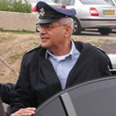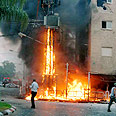


Resigning Chief of Staff Lt. Gen.Dan Halutz testified before the Winograd Committee for no less than seven hours Sunday.
He avoided directly attacking the political echelons or other officials in the defense establishment. Halutz said that it was a definite mistake not to call up the reserves earlier, even if a ground operation was not required at first.
The committee focused on the initial stages of the war on July 12 after the kidnapping of the two soldiers and the considerations to go to battle. Later on in the testimony, the committee panel started asking more pointed questions about the progression of the war and the operations undertaken at its end.
In regards to the beginning of the war, Halutz explained that the basic assumption was that the IDF was going to carry out a limited strike, and not a prolonged battle.
The feet-dragging in preparing the ground forces for operation deep into southern Lebanon territory also came up in the testimony.
Halutz also referred to the various limitations on the IDF even prior to the war, among which were budgetary constraints, and the allocation of forces to theatres of operation in which the IDF was vigorously involved, such as the Gaza Strip.
In all things surrounding the IDF policy on the northern border, the chief of staff said that he operated as per the stipulations of the political echelons, namely, a policy of restraint and only pointed responses to Hizbullah provocations.
'Halutz has one truth'
Sources in the defense establishment noted that though the chief of staff has submitted his resignation, he came with the same version of events that he would have presented had he not resigned.
"He has one truth, and, therefore, a lot of his statements were not surprising because he had said them in the past," said one official.
The chief of staff was asked during his testimony about the relationship between the chief of staff, the defense minister, and the prime minister and about the political-defense interface.
In this context, Halutz referred to the meetings and decisions made on the day the war broke out. Halutz was also asked about the last days of the battle, and the decision to initiate a wide-scale ground operation in the last days of the war after a ceasefire was already decided upon.
In addition, the question of the chief of staff's qualifications, as someone who rose through the ranks of the Air Force, to command a ground operation, including infantry and the armored corps, came up before the commission.
In this context, Halutz was asked about his perception of running the forces, the dominance of the Air Force in achieving objectives on the battle field, and the operational plan as was put together and presented by him to the prime minister and the defense minister on July 12.















